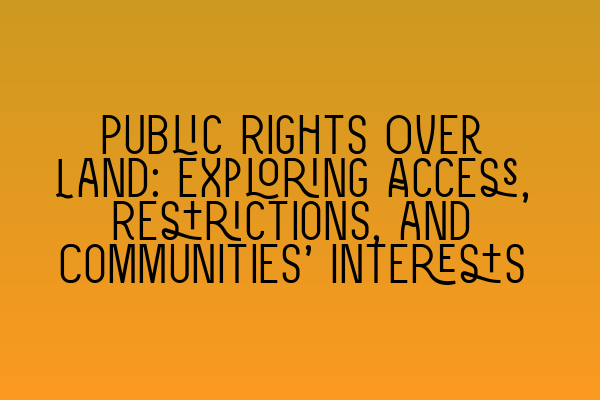Public Rights Over Land: Exploring Access, Restrictions, and Communities’ Interests
Introduction
Public rights over land play a crucial role in shaping the relationship between individuals, communities, and the land they occupy. Understanding these rights is vital for property law practitioners and individuals alike. In this blog post, we will delve into the topic of public rights over land, exploring access, restrictions, and the interests of communities. By examining the intricacies of these rights, we aim to provide a comprehensive understanding of the topic.
Access to Land: A Fundamental Right
Access to land is a fundamental right that allows individuals and communities to enjoy their surroundings and engage in various activities. Public access rights grant individuals the ability to enter and move across certain pieces of land. These rights are important for recreational activities, leisure pursuits, and the exploration of the natural environment.
Restrictions on Access
While access rights are important, it is crucial to understand that there are limitations and restrictions in place to preserve the rights and interests of landowners. Private property rights are equally important, balancing the needs of the public with the rights of individuals who own or occupy the land.
Restrictions on access rights may be imposed due to concerns over safety, security, or the preservation of sensitive habitats or landscapes. These restrictions can be implemented by landowners, local authorities, or government agencies. It is essential to understand and respect these limitations when exercising public rights over land to ensure a harmonious relationship between the public and landowners.
Different Types of Public Rights
Public rights over land can take various forms, depending on the nature of the land and the surrounding community. Some common types of public rights include:
1. Rights of way: These are access rights that allow individuals to pass over someone else’s land. They can be footpaths, bridleways, or other designated routes. Understanding the legal framework around rights of way is crucial to ensure compliance with the law and avoid disputes.
2. Common land: Common land is land owned by one person but used by the public for specific purposes. These purposes may include grazing livestock, collecting firewood, or gathering for community events. The rights and responsibilities associated with common land are complex and may vary depending on the local regulations.
3. Village greens: Village greens are areas of land in a village or town that are traditionally used by the local community for recreational activities. These areas may be subject to specific laws and regulations to protect their use and prevent encroachment by developers.
Communities’ Interests
Public rights over land are closely tied to the interests of communities. These rights can strengthen community connections, promote social cohesion, and contribute to the overall well-being of residents. Access to open spaces, parks, and recreational areas is vital for physical and mental health, fostering a sense of belonging and promoting community engagement.
However, conflicts may arise when the interests of different community groups collide. Balancing the needs and desires of various parties requires careful consideration and legal expertise. Property law practitioners play a significant role in mediating conflicts, ensuring that the rights and interests of all parties are respected and protected.
Conclusion
Understanding public rights over land is essential for property law practitioners and individuals seeking to navigate the complex legal framework surrounding land access, restrictions, and community interests. By recognizing the importance of access while respecting the rights of landowners, we can create a harmonious relationship between individuals and the land they occupy.
If you are looking to further your legal knowledge and prepare for the SQE exams, check out our related articles:
1. SQE 1 Practice Exam Questions
2. SQE 1 Practice Mocks FLK1 FLK2
3. SQE 2 Preparation Courses
4. SQE 1 Preparation Courses
5. SRA SQE Exam Dates
These resources will help you enhance your understanding of property law and prepare for the SQE exams. Remember, having a strong foundation in property law is crucial for providing sound legal advice and representation to clients in this complex area of law.
